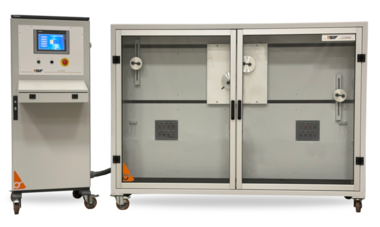
The test consists in simulating the possible application of the cable under extreme work conditions to verify the quality features required by the reference standard.
The cable sample must be tested using a device made of a cart and its moving system and four pulleys.
Two pulleys of the same size must be mounted on the cart and the other two must be attached to the end of the device.
The four pulleys must be positioned so that the cable is horizontal.
The test consists in moving the cable back and forth (cycle) 1 m at a constant speed of approximately 0.33 m/s while it is subject to traction on the two extremities.
Moreover, during the cycles, the sample must be under a test voltage and current which depend on cable type
The handling system must ensure that the cart does not undergo mechanical stresses due to changes in direction.
The parameters that characterize the test are: pulleys, traction load, number of cycles, test voltage and current. The cable must resist a pre-defined number of bending cycles without becoming damaged (interruption or short circuit) under the stated conditions.
SIF, through collaboration with the main testing and research institutions, discussion with clients and careful analysis of all standards, has been able to develop a product with particular focus on:
The true added value of the equipment is the innovative solutions of the Research & Development team, which has paired creativity and engineering to:
1. Supporting mechanical structure with glass doors for protection and test control
2. Pulley adjustment system to keep the test cable horizontal
3. Pulley kit and interchangeable weights based on the type of cables to test
4. Terminal boards for conductor connections positioned inside the mechanical structure for the operator’s safety
5. Current source group up to 32A
6. Auxiliary circuits for detection:
- Test current interruption,
- Short circuits between conductors
- Short circuits between the sample and pulleys
7. Operator control panel with COLOR TOUCH SCREEN DISPLAY for setting and displaying test parameters
- Test voltage selection
- Test Current setting for each channel
- Number of cycles setting
- Short circuit / interruption signal
- START / STOP / RESET buttons
- Anomalies signal
- Visualization of test voltages and currents
- PLC:
- Automatic feedback adjustment of the test current through motorized regulators
- Digital inputs for interruption, short circuit and grounded cable signals and auxiliary circuits
- Analog inputs for measurement acquisition
- Digital outputs for auxiliary and power circuit commands
- Safety management
8. Safety Modules
- Emergency button and safety closure on the protective doors
9. PROFINET interface for PC connection and test reports creation using data acquisition software that allows interfacing with the company network and therefore gives the possibility to take advantage of the benefits for industry 4.0 (optional software)
INNOVATIVE SIF SOLUTIONS
10. SIF_SESM@ Cart driving system without chain, designed in order to eliminate any mechanical stresses caused by a change in direction that are present in chain-movement systems. Produced with direct coupling, it minimizes the noise allowing to keep it in the laboratory and reduces maintenance costs.
11. SIF_SEB@ Ecological low consumption Test power system
12. System for two simultaneous cables
13. Mechanical system for three pulley tests
14. Mechanical system to use a Ø 25mm pulley
15. Electric circuiting to adapt cable resistance selector for low/medium/high value
16. “Kink test” test system